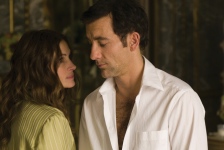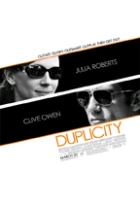Duplicity
|  Writer/director Tony Gilroy’s Duplicity is a fizzy riff on many of the same cutthroat-corporate themes he explored with such gravity in Michael Clayton (2007), his directorial debut that so brilliantly mined the dark, paranoia-inflected terrain of ’70s conspiracy thrillers and the abstract intrigue of European art films. Duplicity, on the other hand, is a substantially lighter affair, mixing its nuanced screwball antics and star wattage with a visual panache of split screens and super-slow-motion that brings to mind the freewheeling experimentation of the ’60s. It is to Gilroy’s credit that he can evoke the cinematic past without coming across like a look-at-me postmodern clown, which he must have learned from modeling his work after the better films of Clayton producer Steven Soderbergh (like Out of Sight) and avoiding the pitfalls of his failures (like Ocean’s Twelve). Writer/director Tony Gilroy’s Duplicity is a fizzy riff on many of the same cutthroat-corporate themes he explored with such gravity in Michael Clayton (2007), his directorial debut that so brilliantly mined the dark, paranoia-inflected terrain of ’70s conspiracy thrillers and the abstract intrigue of European art films. Duplicity, on the other hand, is a substantially lighter affair, mixing its nuanced screwball antics and star wattage with a visual panache of split screens and super-slow-motion that brings to mind the freewheeling experimentation of the ’60s. It is to Gilroy’s credit that he can evoke the cinematic past without coming across like a look-at-me postmodern clown, which he must have learned from modeling his work after the better films of Clayton producer Steven Soderbergh (like Out of Sight) and avoiding the pitfalls of his failures (like Ocean’s Twelve).The story in Duplicity is told in a fragmented mosaic, with the present tense narrative constantly being interrupted by lengthy flashbacks that both expand on the characters and also make increasingly clear both the stakes of the game they’re playing and how everything came to be. This allows Gilroy to toy with our perceptions of the characters, as he gives us scenes in which one thing appears to be happening, but we later learn that it was a con or a ruse or some kind of performance and that there’s another layer of meaning below what we witnessed. It’s the kind of narrative trickery that draws us in, but it’s ultimately up to the actors to keep us interested, and in this regard the film is something of a mixed bag. Duplicity is being marketed almost entirely on the shoulders of its stars, Clive Owen and Julia Roberts, who play Ray Koval and Claire Stenwick, former government agents who have traded in their badges at MI-6 and the CIA, respectively, to work as private-sector spooks. In various ways they are both involved with two mega-pharmaceutical corporations, one of which is run by Paul Giamatti’s high-strung upstart and other of which is run by Tom Wilkinson’s old-school shark. Duplicity’s first and only moment of absolute brilliance is its opening credits sequence, which follows Ray and Claire’s initial hook-up with a shouting match-turned-awkward fisticuffs between the two corporate giants on an airport tarmac. Gilroy plays the sequences in extreme slow motion, which both emphasizes the vitriol with which these competitors loathe each other, but also turns their combativeness into a physical farce, their movements drawn out to such extremes that it becomes unavoidably hilarious. Unfortunately, the rest of the film does not quite live up to that sequence, partially because Gilroy rests so much of the film on Owen and Roberts’ chemistry. And, while many of their scenes together are quite good, especially early on when we have little sense of what’s going on and who’s playing whom, they never quite manage to generate the kind of snap and sparkle that the best on-screen couples appear to have so effortlessly. The film clearly wants to equate their twisty professional tensions as corporate spies working under various layers of duplicity with their prickly romantic travails that frequently demand similar kinds of deception, but the story gets so caught up in the twists and turns of the former that it loses the comedic passion of latter. That is, the film’s corporate espionage (which hinges on one company trying to steal the formula to the other company’s secret mystery product) ultimately becomes more interesting than whether or not Ray and Claire will manage to work out their romantic relationship. As good as Owen and Roberts are as actors (both of whom are allowed a kind of looseness that belies their wattage), it never seem like these two genuinely love each other, which makes their romantic interludes and trust-challenged squabbles feel more obligatory than passionate. The fact that their relationship together hinges on their working together to screw over both corporations inextricably intertwines their personal and professional lives, which is crackling in theory, but never quite catches fire on screen. Thus, we are left with a lot of twisting plot points and last-minute revelations that do little to make us care whether love can survive such serious trust issues. Copyright ©2009 James Kendrick Thoughts? E-mail James Kendrick All images copyright © Universal Pictures |
Overall Rating: 

 (2.5)
(2.5)


